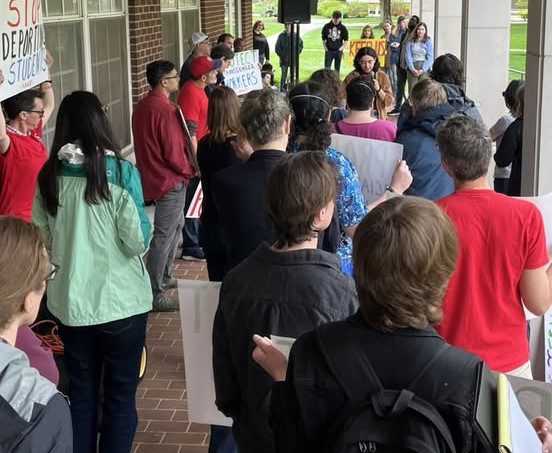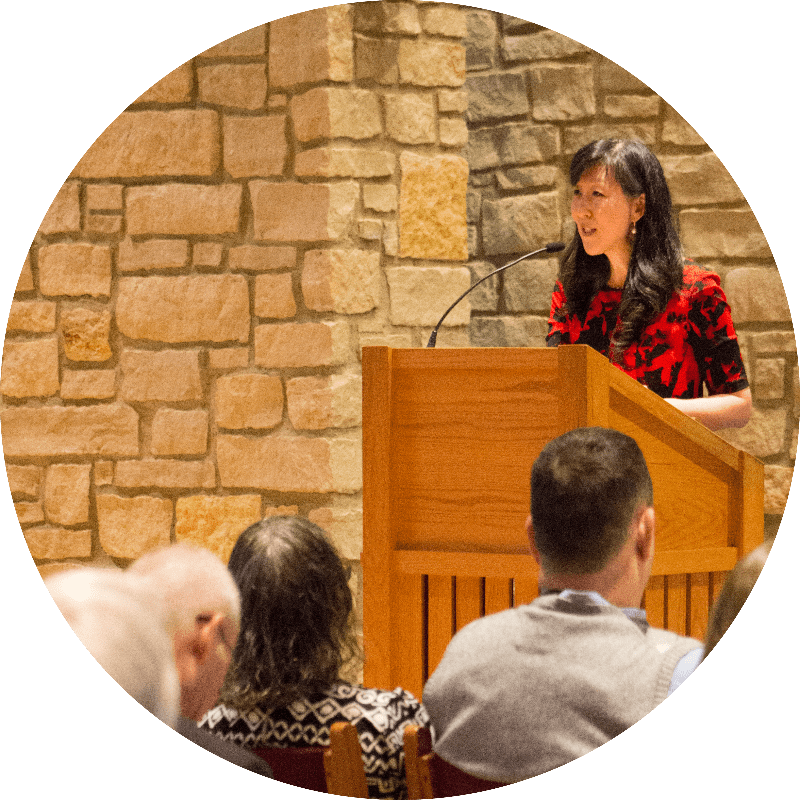Master of Arts in Religion
Many people are called to ministries or vocations that challenge them to become skilled researchers and effective scholarly writers. Others are led to teach at Quaker or other parochial secondary schools. And some choose to follow an academic course that leads to doctoral programs in religious studies. The Master of Arts (M.A.) degree is a terminal degree or steppingstone for each of these paths.
This two-year full-time academic program is available to students who elect to reside in the Richmond, Indiana area or who choose to pursue the degree through ESR Access, our distance learning option.
ESR’s M.A. program helps you build a solid academic foundation in Biblical, theological and historical studies and pursue advanced studies in one of four areas of concentration: Biblical Studies, Christian Theology, Quaker Studies or Peace and Justice Studies. You may also elect to take courses in practical theology and spirituality in order to deepen those areas.

PROGRAM OBJECTIVES AND OUTCOMES
ESR’s M.A. is the scholarly companion to the practitioner-oriented M.Div. program. While both degrees involve academic rigor and attention to spiritual growth, the M.A. is geared toward the development and completion of a thesis to be presented at the conclusion of the program. Graduates of ESR’s M.A. program have built upon the research begun in our program to publish books and/or pursue further study in doctoral programs.
Key takeaways:
- An ability to research and think critically.
- An ability to write creatively and constructively at a Master’s level.
- A survey knowledge of various theological disciplines.
- A focused knowledge in a specific discipline or topic.
Take a Course When You Need It
We understand that not every student is able to commit to a full-time program of graduate study, but that shouldn’t be a constraint if you’re interested in taking seminary courses for professional or personal reasons. This is why we provide the option of applying for admission to our Occasional Student Program and registering for residential or Access classes.
As an Occasional Student, you may take any ESR 100 or 200 level course, or if you have the appropriate educational background, you may take 300 level courses with the permission of the instructor. Occasional students may take as many as two courses per semester.
Please note that students in this program are subject to the same academic performance requirements as M.Div., M.A. and Certificate students.
Program details
Students must complete 42 semester hours, including prerequisites and nine hours on the thesis project. In addition, many students must fulfill a language requirement; this will demand extra time and work. Residency requirements for ACCESS students include 4 residential courses (during Intensives or during semester) and 4 “blended” courses. Residency requirement affecting transfer students stipulate that at least twelve semester hours must be taken at ESR, and that the thesis must be done under the guidance of ESR.
Upper level course work requires a basic foundation in Biblical and Theological Studies (BS 101, B 102, and TS 101). Students who have studied in these areas have the option of fulfilling the credit requirements by satisfactorily passing a proficiency exam for that course
Biblical Studies (3 hours)
Advanced Biblical courses at the 300 level or higher OR a Biblical language course.
Theological Studies (3 hours)
Advanced theology courses at the 300 level or higher. One course must be Constructive Theology.
Historical Studies (3 hours)
These will be chosen from among the following three major periods of church history: History of Christianity I, History of Christianity II, or American Religious History.
Upon the completion of eighteen semester hours, a student may petition the faculty for the appointment of an M.A. Guidance Committee, and present a thesis proposal. Approval of the thesis and the appointment of such a committee by the faculty constitute the student’s admission to degree candidacy.
The thesis project may take one of two forms, each worth nine semester hours of credit. It may be a major, single piece of research, which results in a monograph with a single, unified thesis. Or it may be three separate but related papers, which together form a single monograph with three related theses, but not a single unified thesis. Whichever route taken, the final monograph will normally come to about 25,000 words – a significant amount of research and writing.
In the case of the single thesis, the student will register for thesis credits and perform independent research under the guidance of the chairperson of their M.A. Committee. Students should expect a minimum of two major revisions of their research before achieving the quality expected of a thesis.
In the case of three related papers, the student must base their research on three additional courses beyond the normal M.A. requirements. In this case, the student begins the research with the instructors of the classes forming the context for the original papers. While offering the benefit of a course structure to facilitate research, this option contains the difficulty of showing unified interrelationships among the three papers when they are brought into the thesis project. Students should understand that a high evaluation of a paper in a class does not mean it will receive a high evaluation for the thesis project. Typically, students will have to do major expansions and revisions on their papers before they become acceptable parts of a thesis.
As contrasted with the M.Div./M.Min. degree, it is difficult to predict when the M.A. will be completed, as this depends not on when a certain set of courses is finished but when the student produces a thesis project of sufficient quality to warrant awarding the degree. However, the M.A. must be completed within five years from the time of the residential student’s first class at ESR; Access students must complete their M.A. within seven years.
Students choose an elective. Course work needed to satisfy language or research skills may be used to fulfill the credits for the elective course.
At the time of petitioning the faculty for an M.A. Guidance Committee, the student will choose to focus his or her work in one of the following areas of curricular concentration: Biblical Studies; Christian Theology Studies; Quaker Studies; or Peace and Justice Studies. Together with the chairperson of the student’s M.A. Committee, the student will develop a program of study through 300 level elective courses or biblical language courses in the area of concentration. This program should be designed to offer a solid foundation for thesis research.
Students in the Biblical Studies area of concentration are normally required to demonstrate reading proficiency in Hebrew or Greek. Students in Theological Studies, Peace Studies, Quaker Studies, or Historical Studies are normally required to show reading competence in a foreign language if they do research that draws upon primary sources in that language. A requirement in the language can only be fulfilled by examination. However, faculty may require certain competencies in research skills. Students undertaking research with human subjects must assume the obligations for the welfare of those research subjects, and receive approval from the Earlham College Institutional Review Board (IRB).
Upon satisfactory completion of the M.A. thesis as judged by the M.A. Guidance Committee, the student will take a comprehensive oral examination with the Guidance Committee. It will focus both on the student’s general knowledge and understanding of the major field of emphasis, and also on the student’s particular project represented in the thesis or three research papers. This examination must be completed successfully by the date as specified in the academic calendar.
M.A. students are expected to register for the thesis no later than the semester following the one in which all of the core courses and concentration courses are completed.
The M.A. student who has completed the required courses, who is not regularly enrolled in course work or for thesis credit, and who continues in residence at ESR, will be charged a “Continuing Research Fee.” This will formalize the student’s continuing participation in the ESR community, including community activities, mail box, library privileges, and consultation with faculty.

Our faculty
Earlham School of Religion teaching faculty create collaborative learning environments where students are engaged and challenged to think deeply and critically about matters of faith, theology and religious practice.
Next steps
Ministry isn’t just a vocation or a calling—it’s a way of being in this world, seeking to make it whole. ESR is ready to support you in answering your own call to ministry, whatever shape it takes.